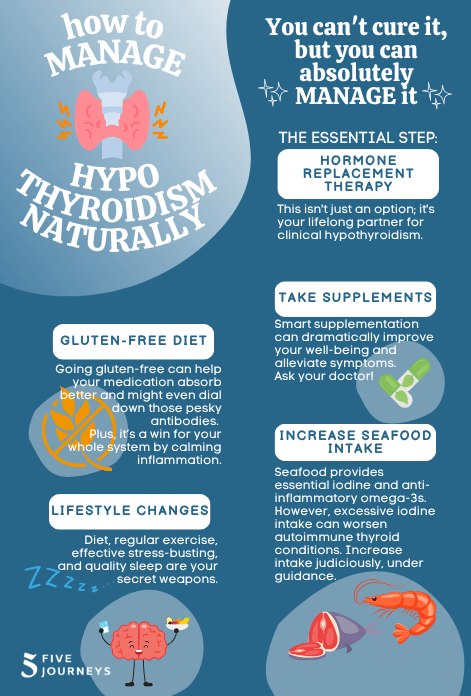Hypothyroidism Treatment
Do you often feel tired? Do your moods swing? Is your weight changing? These could be signs of a common problem: Hypothyroidism.
This occurs when your thyroid isn’t functioning properly. You are not alone; millions of people have it. But you can feel better. We help you manage your hypothyroidism. Our expert team uses both proven medical care and natural ways to help you heal. This helps us find the real reasons behind your condition. So you can get back to living a vibrant, healthy life.
Key Takeaways
Hypothyroidism (underactive thyroid) happens when your thyroid gland doesn’t produce enough hormones, affecting your energy, mood, metabolism, and many body functions.
Common causes include autoimmune conditions (Hashimoto’s), thyroid surgery, certain medications, iodine deficiency, and pituitary gland disorders.
Symptoms often include persistent tiredness, mood swings, weight changes, sleep problems, cold intolerance, dry skin/hair, and brain fog.
Early treatment is very important for restoring energy, helping manage weight, improving mood and cognitive function, and supporting heart, skin, hair, and nail health.
For subclinical hypothyroidism, a personalized assessment is important to determine the best approach.
Lifestyle changes and natural approaches are valuable alongside medical treatment. These can include dietary adjustments focused on nutrient-rich, anti-inflammatory foods (with careful consideration of gluten-free diets for some, and balanced intake of cruciferous vegetables and seafood), targeted nutrient supplementation when professionally guided (for vitamins D, magnesium, and others), and stress management techniques.
What Is Hypothyroidism?
Hypothyroidism, also known as an underactive thyroid, develops when your thyroid gland slows down and isn’t producing enough hormones to regulate your body’s essential functions. These hormones play a crucial role in regulating your metabolism, influencing everything from energy production and heart rate to body temperature and cognitive function. When your thyroid isn’t functioning optimally, it can create a ripple effect throughout your entire system. That’s why seeking hypothyroidism help and finding a personalized treatment plan is essential for restoring balance and well-being.
What Causes Hypothyroidism?
There are several reasons why someone might develop hypothyroidism. Sometimes it’s due to an underlying health issue, while other times it might be a side effect of medication or a result of lifestyle factors. Let’s take a look at some of the common causes.
Autoimmune Diseases
One of the most frequent causes of hypothyroidism is Hashimoto’s thyroiditis, an autoimmune disease. In Hashimoto’s, your immune system mistakenly attacks your thyroid gland, causing inflammation and damage that reduces hormone production. This can lead to a range of symptoms that vary from person to person.
Thyroid Surgery
If you’ve had thyroid surgery to remove all or part of your thyroid gland, you may develop hypothyroidism. This is because the remaining thyroid tissue might not be able to produce enough hormones to meet your body’s needs. In such cases, medication is often necessary to supplement hormone levels.
Medications
Certain medications, such as lithium and amiodarone, can interfere with thyroid hormone production. If you’re taking 1 medication and notice symptoms of hypothyroidism, it’s important to talk to your doctor. They can help determine if your medication is contributing to the problem and adjust your treatment plan accordingly.
Iodine Deficiency
Iodine is a crucial mineral that your thyroid gland needs to produce hormones. While iodine deficiency is less common in developed countries where salt is iodized, it can still occur. If you’re not getting enough iodine in your diet, your thyroid may not be able to function properly.
Pituitary Gland Disorders
The pituitary gland in your brain produces thyroid-stimulating hormone (TSH), which signals your thyroid to produce hormones. If your pituitary gland isn’t functioning correctly, it can lead to low TSH levels and, consequently, hypothyroidism.
Interested in Hypothyroidism Treatment? Ask your provider or book a call with us!
Symptoms of Low Thyroid
Hypothyroidism can manifest in a variety of ways, and the symptoms often develop gradually. It’s important to pay attention to any changes in your body and seek medical advice if you suspect you might have an underactive thyroid.Sleep Problems
Do you find yourself feeling exhausted even after a full night’s sleep? Hypothyroidism can disrupt your sleep patterns, making it difficult to fall asleep, stay asleep, or achieve restful sleep. This can leave you feeling drained and unmotivated throughout the day.Weight Gain
Unexplained weight gain or difficulty losing weight can be a frustrating symptom of hypothyroidism. When your thyroid hormone levels are low, your metabolism slows down, which can make it easier to gain weight and harder to shed those extra pounds.Cold Intolerance
If you’re always reaching for an extra sweater or feeling chilly when others are comfortable, it could be a sign of hypothyroidism. Low thyroid hormone levels can affect your body’s ability to regulate temperature, making you more sensitive to cold environments.Dry Skin and Hair
Dry, itchy skin and brittle hair are common complaints among people with hypothyroidism. Thyroid hormones play a role in skin cell turnover and hair growth, so when levels are low, it can affect the health and appearance of your skin and hair.Brain Fog
Do you find yourself struggling with memory, concentration, or mental clarity? This “brain fog” is a common symptom of hypothyroidism, often characterized by forgetfulness, difficulty focusing, and a general sense of mental fatigue. Research has shown that brain fog can significantly impact daily life and even affect medication adherence. If you’re experiencing brain fog, it’s important to discuss this with your healthcare provider to explore potential causes and treatment strategies.Lifestyle Changes and Self-Care
At Five Journeys, we believe in getting to the root of your health problem. Yes, medicine helps balance your body’s hormones. But we go deeper. For true healing, daily habits and self-care are essential for your thyroid. We want the best for you.
Think of your body like a garden. Your thyroid is one important plant. But the whole garden needs care! When you nurture your whole self, through good food, movement, sleep, and managing stress, you can truly heal. These simple changes work with your medical care to bring you balance and give you more vitality.
Our experts will guide you on this healing path. Adjusting your daily life is a powerful part of treatment, supported by science. Together, we’ll find easy plans that fit your life. This will help you reclaim your energy, improve your focus, and feel truly well again.

At Five Journeys, we believe in an integrative approach, combining the best of conventional medicine with evidence-based natural therapies.
Benefits of Early Hypothyroid Treatment
Addressing hypothyroidism promptly can make a significant difference in your overall health and well-being. Here are some of the benefits of early intervention:Restoration of Energy Levels
With proper hypothyroidism treatment, you can experience a noticeable boost in your energy levels. As your thyroid hormone levels return to balance, your metabolism will rev up, giving you more stamina and vitality to enjoy your daily activities.Prevention of Weight Gain
Early intervention can help prevent or manage weight gain associated with hypothyroidism. By addressing the underlying hormonal imbalance, you can support a healthy metabolism and make it easier to maintain a healthy weight.Improvement in Mood and Cognitive Function
Hypothyroidism can affect your mood, concentration, and memory. Treating the condition can lead to improvements in these areas, helping you feel more like yourself again.Better Heart Health
Untreated hypothyroidism can increase your risk of heart problems. By controlling your thyroid hormone levels, you can protect your heart health and reduce your risk of complications.Enhanced Skin, Hair, and Nail Health
Treating hypothyroidism can improve the health and appearance of your skin, hair, and nails. You may notice increased moisture, shine, and strength as your hormone levels normalize.Important Considerations for Subclinical Hypothyroidism
In cases of subclinical hypothyroidism (mildly elevated TSH levels with or without subtle symptoms), the decision to initiate medication requires careful consideration. Treatment with levothyroxine for those with TSH levels between 5 and 10 mIU/L may not always result in significant improvements.Natural Ways to Cure Low Thyroid
While conventional treatment with medication is often necessary to manage hypothyroidism effectively, many individuals seek natural therapies to support their thyroid health and overall well-being. At Five Journeys, we believe in an integrative approach, combining the best of conventional medicine with evidence-based natural therapies.
It’s important to note that the term “cure” should be used cautiously when discussing hypothyroidism. While natural therapies can be powerful allies in managing symptoms and supporting thyroid function, they may not eliminate the need for medication in all cases. Our focus is on helping you achieve optimal health and well-being through a personalized combination of conventional and natural approaches.
Here are some of the natural therapies we may explore together:
Here are some natural approaches we may explore together, keeping science at the forefront:
Dietary Adjustments for Thyroid Health
Focus on Nutrient-Rich Foods
Incorporating foods rich in essential micronutrients, such as iodine, selenium, zinc, iron, and vitamins B12, D3, and A, is valuable for supporting optimal thyroid gland function. Anti-inflammatory diets, like the Mediterranean diet, rich in fruits, vegetables, and omega-3 fatty acids, are also recommended, particularly for autoimmune thyroid conditions.
Gluten-Free Diet
For individuals with co-existing celiac disease or non-celiac gluten sensitivity, a gluten-free diet is scientifically beneficial. It can improve levothyroxine absorption and may reduce thyroid autoantibody titers. However, for those without these sensitivities, direct thyroid benefits are less clearly established.
Cruciferous Vegetables
Concerns that cruciferous vegetables “harm your thyroid” are largely an oversimplification. Goitrogens, compounds found in these vegetables, primarily interfere with thyroid function only in excessive raw quantities or with iodine deficiency. Cooking significantly reduces goitrogen levels, making these highly nutritious foods safe and beneficial in moderate, cooked consumption.
Seafood Intake
Seafood provides essential iodine and anti-inflammatory omega-3s. However, excessive iodine intake, particularly from supplements or certain seaweeds, can trigger or worsen autoimmune thyroid conditions. A balanced approach and professional guidance on iodine intake are key.
Targeted Nutrient Supplementation
Iodine, Selenium, and Tyrosine
While these are fundamental for thyroid hormone synthesis, the idea that simply taking them will lead to “natural repair” is an oversimplification. Excessive iodine is a significant cause of thyroid dysfunction and autoimmunity. Selenium supplementation can be beneficial in Hashimoto’s for reducing antibodies, and tyrosine is a precursor for hormones. Any supplementation with these should be guided by a healthcare professional, as dosages and individual needs vary greatly, and excess can be harmful.
Vitamins D and Magnesium
Deficiencies in Vitamin D and Magnesium are common in hypothyroid patients, and correcting these can alleviate symptoms like fatigue, stress, and sleep disturbances. These should be tested for and prescribed by a doctor to avoid excessive dosing or interactions.
Stress Management Techniques
Chronic stress can negatively impact thyroid function. Incorporating practices like mindfulness, meditation, and deep breathing exercises can help you manage stress and promote hormonal balance.
Our experienced practitioners will work closely with you to develop a personalized plan that combines the most appropriate conventional and natural therapies for your unique situation. We’ll monitor your progress closely and make adjustments as needed to ensure you’re receiving the best possible support on your journey to thyroid health.
Addressing Popular, Unproven Claims
Some forum claims, such as the idea that celery juicing is “highly beneficial” for thyroid health, lack scientific support. Similarly, highly restrictive diets like the Carnivore Diet generally lack strong scientific evidence for broad efficacy in hypothyroidism and may pose nutritional risks. These claims should be approached with caution and not be used as a substitute for evidence-based guidance.
Claims that essential oils (like clove, lemongrass, and frankincense) directly increase thyroid activity when applied topically are not supported by scientific evidence. While some may offer indirect benefits through stress relief, they are not a substitute for medical treatment.
Why Improve Your Health With Five Journeys?
At Five Journeys, we understand the challenges of living with hypothyroidism. Our team of experienced practitioners is dedicated to providing compassionate, individualized care that empowers you to take control of your health. Here’s why you should consider partnering with us on your journey to wellness:
Holistic Approach
At Five Journeys, we recognize that true wellness encompasses more than just physical health. We take a holistic approach that considers all aspects of your well-being, including physical, emotional, mental, and spiritual health.
Personalized Care
We understand that each individual is unique, and their health needs are different. That's why we tailor our services to meet your specific needs and goals. Whether you're seeking preventive care, managing chronic conditions, or optimizing your overall health, we provide personalized solutions that prioritize your well-being.
Insurance Accepted
If you’re seeking natural treatment for hypothyroidism or underactive thyroid, Five Journeys offers a unique and supportive approach. We believe in the power of combining conventional medicine with natural therapies to help you achieve optimal health and well-being. Don’t let hypothyroidism hold you back any longer. Schedule a consultation today in Boston and Newton and discover how we can help you reclaim your vitality and live your best life.
*Massachusetts law does not allow us to accept MassHealth & Medicaid. Other exceptions may apply.
References
Calissendorff, J., & Falhammar, H. (2021). Subclinical Hypothyroidism: To Treat or Not to Treat? Medicina (Kaunas), 56(1), 40. https://www.mdpi.com/1648-9144/56/1/40
Cline, J. C. (2015). Nutritional Aspects of Detoxification in Clinical Practice. Alternative Therapies in Health and Medicine, 21(3), 54–63.
Haskard-Zolnierek, K., Wilson, C., Pruin, J., Deason, R., & Howard, K. (2021). The Relationship Between Brain Fog and Medication Adherence for Individuals With Hypothyroidism. Clinical Nursing Research, 30(1), 1–8. https://doi.org/10.1177/10547738211038127
Kris-Etherton, P. M., Lichtenstein, A. H., Howard, B. V., Steinberg, D., Witztum, J. L., & for the Nutrition Committee of the American Heart Association Council on Nutrition, Physical Activity, and Metabolism. (2004). Antioxidant Vitamin Supplements and Cardiovascular Disease. Circulation, 110(5), 637–641. https://doi.org/10.1161/01.CIR.0000137822.39831.F1
Krawczyk, M., Chojnicki, M., Konarzewska, D., & Waszczuk, P. (2023). The gut microbiome in children with mood, anxiety, and neurodevelopmental disorders: An umbrella review. Gut Microbes, 15(1), 2235941. https://doi.org/10.1080/19490976.2023.2235941
Oesch, F., Herrero, M. E., Hengstler, J. G., Lohmann, M., & Arand, M. (2003). Metabolic Detoxification: Implications for Thresholds. Toxicological Sciences, 75(2), 383–391. https://doi.org/10.1093/toxsci/kfg188
Prior, R. L., & Cao, G. (2000). Analysis of Botanicals and Dietary Supplements for Antioxidant Capacity: A Review. Journal of AOAC International, 83(4), 950–956. https://doi.org/10.1093/jaoac/83.4.950
Sekirov, I., Russell, S. L., Antunes, L. C. M., & Finlay, B. B. (2010). Gut microbiota in health and disease. Physiological Reviews, 90(3), 859–904. https://doi.org/10.1152/physrev.00045.2009
Smith, R. L., Soeters, M. R., Wüst, R. C. I., & Houtkooper, R. H. (2018). Metabolic Flexibility as an Adaptation to Energy Resources and Requirements in Health and Disease. Endocrine Reviews, 39(4), 489–517. https://doi.org/10.1210/er.2017-00211
Winterstein, A. P. (2009). Herbal Supplements and Considerations for Athletic Trainers. Athletic Therapy Today, 14(6), 33–37. https://doi.org/10.1123/att.14.6.33
Wu, K., Zhou, Y., Ke, S., Huang, J., Gao, X., Li, B., Lin, X., Liu, X., Liu, X., Ma, L., Wang, L., Wu, L., Wu, L., Xie, C., Xu, J., Wang, Y., & Liu, L. (2021). Lifestyle is associated with thyroid function in subclinical hypothyroidism: a cross-sectional study. BMC Endocrine Disorders, 21(1), 112. https://link.springer.com/article/10.1186/s12902-021-00772-z
Why we do, What we do...
































